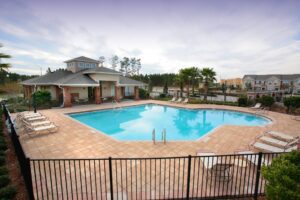Suitable Swimming Pool Fencing Options From Atlanta Fence Company
Effective swimming pool fencing is a no-brainer, especially for children and adults who are unable to swim. While specially designed pool fencing is ideal, there are other options, as any reliable Atlanta fence company will be able to advise.
When you build or install a swimming pool in Georgia, your local authority will have specific requirements in terms of construction, electrical connections, plumbing, fencing and other elements. Generally, the 2012 International Swimming Pool & Spa Code is enforced with several Georgia Amendments, though some municipalities enforce stricter regulations than others.
At the end of the day, you need to be sure you follow them, not only to ensure your pool is legal, but also to be sure it is safe.
Fencing and Other Barrier Options Specified in the Code
The requirements of the international Code focus on physical barriers and warning devices that an Atlanta fence company or other business can provide to protect people from potential drowning in “all aquatic vessels” except portable exercise and portable residential spas.
All outdoor swimming pools, except hot tubs and spas that have lockable safety covers, must be surrounded by a barrier of some kind that meets the specifications of the code. The most important specifications include height (it should usually be at least four feet high), the size of openings, and gates. For instance:
Openings may not be of a size that is big enough to allow a ball with a four-inch diameter to pass through them. What this means is that even a small child or animal won’t be able to push their way through the barrier into the pool area.
- Solid barriers must not have any structural element that can be used as a foothold or handhold, to allow someone to pull up and over the fence. So you could get an Atlanta fence company or company in another part of the state to build a wooden or vinyl fence around the pool, providing any horizontal rails are on the inside.
- If a wooden or other fence has diagonal sections or struts these mustn’t be more than 1.75 inches apart.
- If pumps, filters and other equipment is located on the outside of the pool, these need to be at least three foot away from the barrier so that they can’t be used as a step.
- The largest allowable opening of chain link fences is 1.75 inches.
- The pool (aquatic vessel) also has to be at least 20 inches away from the barrier.
- Gates installed in fences should open outwards, away from the pool. They should also be self-closing with a self-latching device.
- If the wall of the house forms part of the safety barrier, there are specific requirements for alarms that will go off if, for instance a window is opened. Other requirements where the house wall is part of the barrier include power safety covers.
- In some instances the pool itself can become the barrier; specifically if it is an on-ground structure, or if a barrier has been mounted on the top of the pool structure.
Essentially what this amounts to is the need to ensure that nobody can access any kind of swimming pool from the street or any other public place. But even having complied with the relevant laws and regulations, it is vital not to become complacent. Soil can quickly erode at the base of fences and animals and children may be able to dig their way underneath. They don’t realize the dangers!
FenceWorks of Georgia is a long-established Atlanta fence company that can help you create a good-looking barrier around your swimming pool that will be safe, compliant, and will meet your landscaping needs. Contact us for ideas and a quotation.


